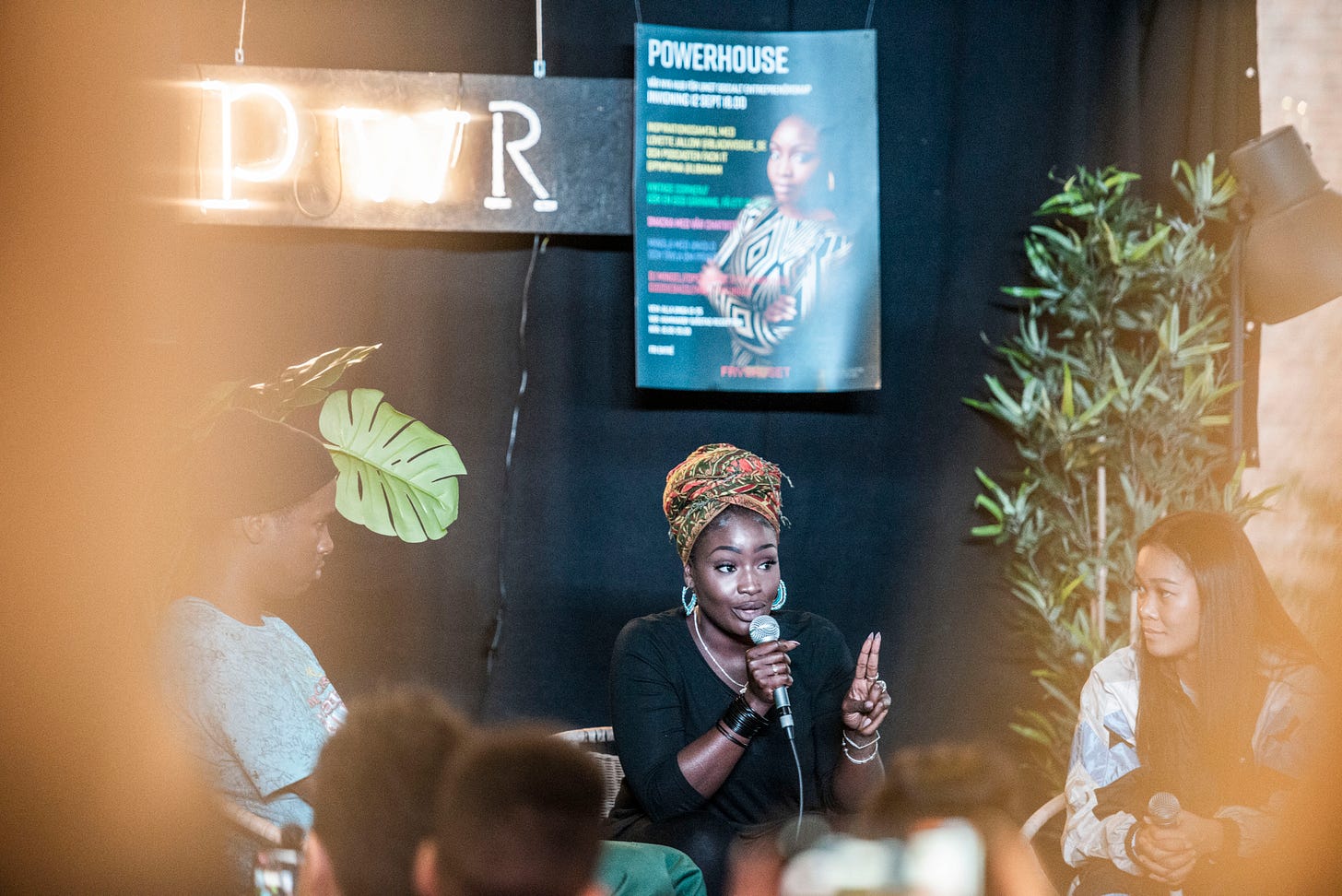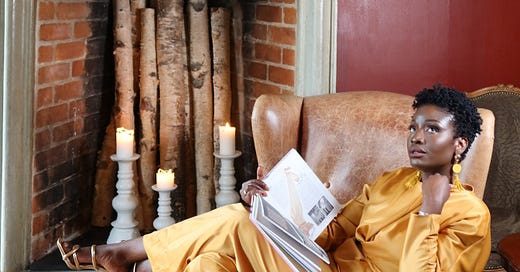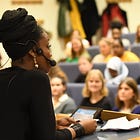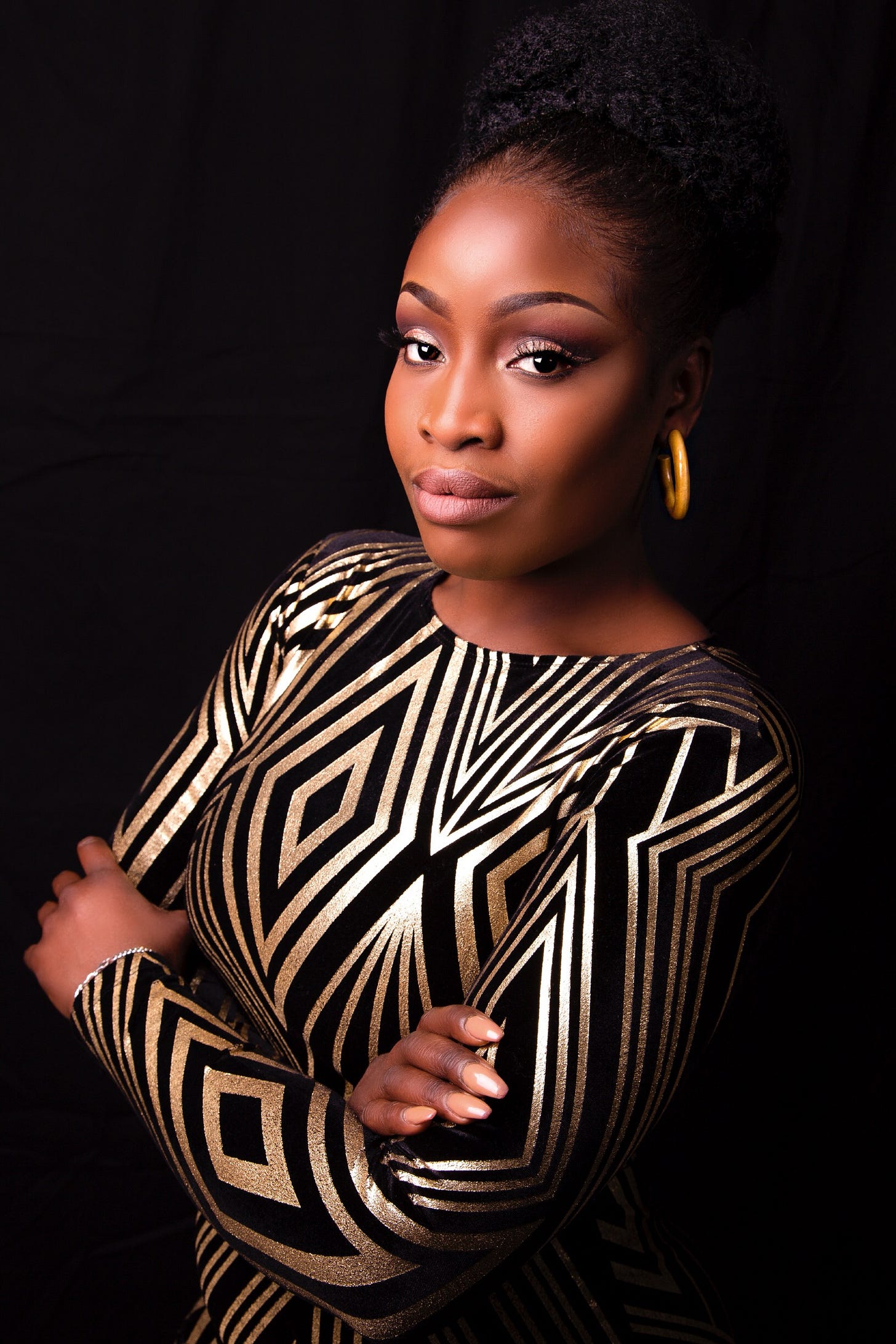When Rejection Sensitivity Becomes Emotional Coercion
Rejection Sensitivity and Emotional Projection: How Therapy-Speak Turns Fragility into Harm
What Rejection Sensitivity Asks of Black Women
What happens when a white woman desires proximity to a Black woman emotionally, romantically, or socially but feels rejected? What does RSD look like when filtered through entitlement, racial dynamics, and unprocessed fragility?
For many of us—especially Black autistic women there’s a familiar pattern: your clear boundary becomes their wound. Your “no” gets rewritten as harm. And soon, you’re no longer a person. You’re a character in their healing arc.
This essay is about that rewrite. And what it costs us when rejection sensitivity becomes a tool of emotional revisionism.
I’ve had to sit long and hard with why I struggle to maintain personal relationships with people who experience intense rejection sensitivity.
I realized even with compassion and understanding, their feelings however real keep trying to rewrite mine. When someone spirals from a perceived slight and demands I cushion their experience, I don’t feel connected—I feel erased. I’ve already spent years learning to regulate my tone so I wouldn’t be read as aggressive.
I’ve already been told my bluntness is violence. I’ve already swallowed pain to protect people from theirs.
And now? Now I won’t do that just to stay palatable because someone else hasn’t invested in regulating their nervous system. Especially when they never asked what I meant or invested time to learn me despite me pacing the intensity of the relationship. Especially when they assumed harm where there was only boundary.
This is why every friendship I build begins with an acquaintanceship period—six to twelve months in the shallow end before we even consider the deep water. People show you who they are when they think you owe them intimacy.
Just because you perceive rejection doesn’t mean you were rejected.
Tone isn’t violence. Clarity isn’t cruelty.
And real care never asks me to disappear in order to be loved.
RSD Isn’t the Villain—But It’s Not the Victim Either
“RSD may explain the feeling. It does not excuse the behavior.”
Rejection Sensitive Dysphoria (RSD) is not a diagnosis. It’s a descriptive term, used mostly in ADHD and autism communities, to capture a particular kind of pain—intense, often disproportionate reactions to perceived rejection, failure, or criticism. For some, this pain is real and debilitating. But the terminology itself sits in a grey zone: clinically ambiguous, highly individualized, and often shaped more by community language than medical consensus.
What’s often missing in these conversations is this: RSD may explain why someone feels something strongly. But it does not explain—or excuse—how they behave in response.
Too often, RSD gets weaponized as a shield against accountability. “I’m just triggered” becomes a full-stop defense. But pain doesn’t absolve harm. It contextualizes it.
What’s also concerning is how RSD is narrated through power. When someone socialized as white and feminine expresses rejection sensitivity, the world often rushes to accommodate them. Their pain is coddled. Their reactions softened. But when Black people, especially Black autistic women, set firm boundaries in response to the same projection, we are read as cold, punishing, or emotionally withholding. Structural bias shapes whose rejection sensitivity is allowed to take up space—and whose clarity is punished for disrupting it.
RSD is real. But it is not neutral. It doesn’t happen in a vacuum. It unfolds in relationships, across race, gender, ability, and expectation. And until we’re honest about how those dynamics intersect, the label will continue to be misused—not as a tool for self-understanding, but as a tool for rewriting other people’s behavior through the lens of one’s own unresolved narrative.
Now, let me show you what happens when that boundary gets perceived as harm.
Case Study: When Rejection Sensitivity Becomes Emotional Coercion
“Feminism was not built to hold intersectionality. Black women are.”
Note: While anonymized, this case is drawn from a recent dynamic where someone pursued me with intensity, framed herself as deeply self-aware, and ultimately recast the story as rejection—because I did not soften myself to accommodate her fear.

She was white, queer, neurodivergent, and polyamorous. A mother. Divorced. Raised religious with trauma. She led with vulnerability, and I saw no reason not to meet her there.
From the start, she called our connection rare. She affirmed me constantly. Praised my writing, my clarity, my presence. She said I was the kind of person she didn’t think she’d meet again.
She initiated everything. Moved fast. I can match most people, but in the end, I’ll honor my own tempo. I asked to move slowly and build trust.
But what began as pursuit quickly turned into curation. She curated her words, her tone, her reactions—crafting safety rather than embodying it. She wanted proximity, but misread my slower pace as rejection.
Suddenly, the woman who feared abandonment began enacting it. Not because I was unsafe. Not because I disappeared. But because I didn’t.
She told me she was afraid I’d block her because she didnt comprehend my sarcasm. Then she blocked me when I was clear. Not to protect herself, but to preempt a narrative she’d already written. One where I became the villain the moment I refused to perform softness or negotiate my boundaries. The moment I said no to emotional choreography that centered her desires and sidelined mine.
What broke the dynamic wasn’t misunderstanding. It was my refusal to self-abandon. I am clear in how I move—online and offline. I name what I want, what’s possible, and what’s off the table. I say what grounds me. I don’t chase ambiguity. And when something is unclear, I clarify, without baiting, without drama. I also expect the same: if something doesn’t make sense, ask. Don’t assume. Even if you don’t get my humor, say so. I want people to carry their lack and resolve it even if they need my help with that but to project it will always fail.
But people like to fragment Black women. I’ve written about this. They isolate the parts they don’t understand, extract the parts they crave, and build entire fantasies around what they refuse to see whole. Castles in the sky. And when we refuse to climb, we become the threat.
She told me, straight-faced, “I can’t wait for the Black girlfriend effect to take hold.” As if I were a rite of passage. A projection screen. A personal transformation arc waiting to serve her growth. There was no curiosity about what she could offer someone she held structural privilege over—only what she could extract, consume, elevate herself through. She recounted, in detail, what her ex-wife allegedly took from her, never pausing to examine what she gave or withheld.
You remember what I wrote in this essay—my grandmother’s infamous warning: listen closely when people speak of others without proof. When they call 10 people narcissists, when they narrate past relationships as harm inflicted but never accounted for, they are telling you exactly how they build their version of truth. Like estranged parents who frame their children as difficult but never reflect on what made them unreachable.
That wasn’t intimacy. That was extraction. And I saw it early.
How Proximity Becomes Entitlement
“Proximity isn’t safety. Familiarity isn’t accountability.”
So I asked her—early on—how she was accountable to Blackness in her proximity to it. She called herself an “intersectional feminist,” a term that contradicts itself. Feminism, by design, was never made to hold intersectionality. Black women are intersectional. No one else. So how, I asked, do you answer to that?
She told me I could speak to her short term ex. A Black woman.
As if Black women need references.
As if my question could be outsourced to a Black woman to perform labour for her.
As if past proximity justifies present entitlement.
As if another Black woman should carry the burden of explaining her safety to me.
What I heard was: “I interact a Black person. So I must be safe.” We’ve heard that before—when people harm Black communities and defend themselves with “I have a Black partner,” or “my kids are Black.” As if proximity means alignment. As if harm can’t come from the familiar.
But serial killers have wives. Abusers have fans. Proximity isn’t safety. Familiarity isn’t accountability.
And by then, I already knew—at best, she was unready. At worst, I was being studied. Maybe she needed an alibi. A strong voice that carries.
Her worldview was built on projection—idealization, then fear, then hostility. That’s the socialization of whiteness. And this was not a white partner safe for Black people working toward liberation.
So I named it. By then, her rejection sensitivity had already rewritten me as the threat. I was no longer a person—I was a trigger. A boundary became abandonment. My clarity became cruelty. What she called fear was, in practice, control.
Projection Is Not Connection
“I won’t be anyone’s mirror—especially not for people who know they’re projecting and do it anyway.”
I’ve learned this the hard way: just because someone feels rejected doesn’t mean I rejected them. I’ve spent most of my life being misread. Despite speaking seven languages, despite being a clear and direct communicator, I’m constantly misunderstood—because I’m Black, because I’m autistic, because I refuse to contort myself for fragile egos. I’ve spent years decoding how that misreading functions. Now I recognize it immediately, even when it’s dressed up as softness.
Even in so-called safe spaces—activist circles, neurodivergent communities, trauma-informed work—I’ve been expected to pre-empt someone else’s emotions before I even speak. And still, it happens:
Someone tells me I’m harsh.
That I disappeared.
That I was unsafe.
Not because of what I did—but because of what they felt. Because I didn’t offer enough cushioning. Because I didn’t apologize for being blunt. Because I didn’t say it in a way that let them stay the protagonist.
They go by percieved vibes meanwhile, I had already compiled spreadsheets, timestamps, and behavioral patterns. I ran a quiet background check, not out of paranoia, but because I come from constellations where people like this have always existed. My body knows the signs. I don’t romanticize red flags. I track them. And when my body reacts I listen communicate and separate whats mine and whats theirs.
And let’s be clear—I don’t experience Rejection Sensitivity Dysphoria. I empathize with those who do. But I also know what it feels like to have someone else’s trauma projected onto me as if it were truth. It’s not just tiring. It’s violating.
It’s someone rewriting my tone, my intentions, my boundaries—without my input. “Now, on top of being misread by the world, I’m being misread by people I thought would understand better.” What they call a “trigger” is often just my refusal to bend. And I’m no longer interested in performing emotional janitor work for people who won’t take responsibility for their own projections.
If you perceive rejection in my bluntness and start moving weird—I’ll clarify once. Once. We are grown. Keep your side of the street clean.

I’m Not Here to Play Therapist, Mirror, or Parent

I used to think that if I could explain myself well enough, I wouldn’t be misread. That if I was gentle, nuanced, pre-emptively compassionate—maybe their nervous system would settle, and I wouldn’t be pulled into the spiral.
But here’s what I’ve learned:
Some people already know they’re projecting and do it anyway.
“I won’t be anyone’s mirror. Especially not for those who are aware of their patterns but refuse to address them.”
I pay good money a year for therapy.
My NGO funds trauma support for women across borders.
I do the work. I’ve paid for the work. I know what accountability looks like in practice—not performance.
So no—I won’t serve as a stand-in for your absent parent, your abandonment wound, or the narrative where I’m cast as the punisher so you don’t have to face yourself.
And when I lead teams or collaborations, I ask directly:
How do you manage your rejection sensitivity?
What are your tools? Your capacity? Your thresholds?
Because I run a tight ship. I don’t do therapeutic detours disguised as professional communication. I’ve tried that. It nearly broke me.
Your team is only as strong as the member who knows what they need and names it. Clarity is not cruelty. Silence is not betrayal. Emotional safety requires shared responsibility.
Especially when you're Black, femme, and autistic, someone else's misreading can cost you more than misunderstanding. It can cost you your reputation. Your career. Your health.
I don’t get the luxury of emotional chaos at work. I don’t get to spiral and expect the room to cushion it. I’ve had to remain clear, structured, and stable for everyone else’s comfort.
So if I ask about your regulation, it’s not judgment, it’s mitigation and to pre-empt for support needs.
Because I can’t afford to be dragged into another dynamic where my boundaries are framed as betrayal, my directness as cruelty, or my calm refusal to perform is read as harm.
Not when I know what happens next.
Not when I’ve lived it.
Not when Black people’s careers and actual lives have been torn down by someone else’s unexamined rejection sensitivity.
The Structural Bias Behind Who Gets to Spiral
Here’s the part most people won’t say out loud: When someone socialized as white brings rejection sensitivity into Black spaces, it’s not just about wanting to be understood—it’s often about wanting to be centered.
They want to be fragile and seen as trustworthy. They want intimacy without accountability. They want to stay in the room, even when their presence distorts the air. And what does it cost me to keep making space for that?
I wrote Främling i vita rum—Stranger in White Spaces because this dynamic doesn’t just happen in personal relationships. It repeats everywhere: in activist circles, in neurodivergent spaces, in professional collaborations that claim to be decolonial but still demand my compliance in the face of white fragility.
What’s framed as sensitivity in them is seen as severity in me. They cry and get comforted. I speak clearly and get labeled unsafe. Their spiral is treated as sacred. Mine is treated as aggression. Their rejection sensitivity gets context. Mine gets consequences.
So no—I don’t center other people’s abandonment fears anymore. Especially not when doing so would require me to abandon myself. I’ve done that before. Many times. And every time, I left with less of me.
I care. But I’ve learned to care about me first.
Rejection Isn’t Abuse And Boundaries Aren’t Betrayal
You may wonder what actually happened in the case study.
I leave people where they begin their rewrites. And no one gets to dictate how I experience them. None of us can control another person’s internal story—but externally, we are accountable. Proof matters. I have it. So do the mutuals we share. The ones who know me well. The ones who read the subliminals confused.
She wrote publicly that our connection felt mutual. That it mirrored the “20-year-old lesbian style”—where you forget to eat and overinvest. I suppose she means she did. My sleep and eating have been AuDHD-chaotic since I was eleven. She said healing taught her to recognize patterns. That truth doesn’t change just because the packaging does. That she was walking away—calmly, clearly, with certainty.
But what she omitted is this: I said no early. I named the possibility of friendship and was clear about the limits of anything more. What she’s now calling “clarity” was rejection—given gently, now rewritten theatrically. A rewrite that mimics her therapist ex she writes about that caused harm. This false rewrite tries to reframe the power of a healthy boundary she couldn’t undo.
What she calls healing now is just upgraded avoidance. If you’ve really done the work, you don’t need a public rewrite to make it feel real. And if you can’t hold truth without reshaping it into fiction, you haven’t healed. You’ve just rehearsed a version that avoids shame.
This is the cost of accommodating unchecked RSD. This is what happens when performance is mistaken for growth.
It’s why I don’t conflate therapy-speak with accountability. Why I stay cautious of men in feminist spaces and white people in Black ones, because borrowed language gets repeated without context, then weaponized to deflect instead of take ownership.
This is why I ask: How do you manage your dysregulation, or how do you hold yourself accountable to Blackness—not just what do you call it? Because I’ve watched fragility wrapped in frameworks, recited like scripture, and used to excuse harm.
She knew the language. She used the right terms. But her behavior told the truth. The self-narration of harm. The reframing of rejection as “clarity.” The curated exit dressed up as growth. None of it stands when examined closely.
Proximity to insight is not the same as integration. Especially when the real discomfort isn’t rejection.
It’s being seen clearly, by someone you can’t gaslight. Without distortion. Without flattery.
Just truth.
Work With Me: Inclusion Strategy, Keynotes, and Critical Conversations

In addition to writing, I work internationally as a neurodivergent inclusion strategist, keynote speaker, and consultant.
I help organizations move beyond surface-level diversity initiatives to create environments where neurodivergent, disabled, and marginalized individuals are genuinely supported.
If your organization, collective, or institution is ready to rethink accessibility, inclusion, and systemic accountability, you can book me for:
Lectures
Keynote speeches
Panel discussions
Workshops and trainings
🔹 Book me: lovettejallow.com
🔹 Contact: Lovette@Lovettejallow.com
Explore More from The Lovette Jallow Perspective
You can find more of my essays exploring:
Neurodivergence, autism, and navigating public life as a Black woman
Building true inclusion beyond checkbox diversity
Reclaiming voice and agency across personal, political, and historical landscapes
Racism in Sweden and systemic injustice
Each essay connects real-world experience with structural analysis—equipping individuals and institutions to think deeper, act smarter, and build sustainable change.
Who is Lovette Jallow?
Lovette Jallow is one of Scandinavia’s most influential voices on systemic racism, intersectional justice, and human rights. She is a nine-time award-winning author, keynote speaker, lecturer, and humanitarian specializing in:
Neurodiversity and workplace inclusion
Structural policy reform
Anti-racism education and systemic change
As one of the few Black, queer, autistic, ADHD, and Muslim women working at the intersection of human rights, structural accountability, and corporate transformation, Lovette offers a uniquely authoritative perspective rooted in lived experience and professional expertise.
Her work bridges theory, research, and action—guiding institutions to move beyond performative diversity efforts and toward sustainable structural change.
Lovette has worked across Sweden, The Gambia, Libya, and Lebanon—tackling institutional racism, legal discrimination, and refugee protection. Her expertise has been sought by outlets like The New York Times and by leading humanitarian organizations addressing racial justice, policy reform, and intersectional equity.
Stay Connected
➔ Follow Lovette Jallow for expert insights on building equitable, neurodivergent-affirming environments.
🔹 Website: lovettejallow.com
🔹 LinkedIn: linkedin.com/in/lovettejallow
🔹 Instagram: instagram.com/lovettejallow
🔹 YouTube: youtube.com/@jallowlovette
🔹 Twitter/X: twitter.com/lovettejallow
🔹 Bluesky: bsky.app/profile/lovettejallow.bsky.social












Another excellent piece of writing, on a tricky topic.
RSD is new to me, but when I think of rejection, I envision sincerely offering someone my love and having it returned to sender. That type of rejection can be heartbreaking, but ultimately strengthening. The type of rejection that weakens us is the kind in which we are not offering love, but entitlement: “I feel entitled to your love and you are withholding it from me and now I feel bereft (and angry).” One form of rejection is of an offer that comes from a place of fullness and while it hurts to not be able to give love, the giver can return to the well and carry on. The second claim of rejection is based on using and comes from a place of emptiness and lack. Its cycle of blame and perceived powerlessness (“you have something I need and you are selfishly withholding it from me”) is an endless spin that never resolves itself. It must be abandoned, wholesale.
Brava, for your hard-won wisdom and self-care!
God, you make my heart ache, not in a bad way but thatcglare of recognition. Until recently I spent my entire adult life doing this, I'm ashamed to say. Acting rejected because of my own insecurities and then projecting it onto them. Having recently realised how unfair this is, I am now an addict withdrawing from my own ego.
That insistence on ( imagined? ) connection means being very careful socially. Don't break yourself or others.
I came to say that you are changing my life. Your writing is a lot of small explosions in my head. Knowledge is power after all. Thank you always. You have made me both a better man and a better human. No holy book or otherwise has done this, only you. X